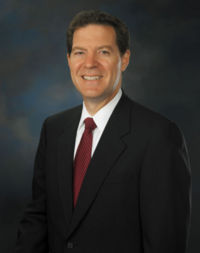| Sam Brownback | |||
|---|---|---|---|
| |||
| United States Ambassador-at-Large for International Religious Freedom From: February 2018 | |||
| Predecessor | David Saperstein | ||
| Successor | Incumbent (no successor) | ||
| Governor of Kansas From: January 10, 2011 – January 31, 2018 | |||
| Predecessor | Mark Parkinson | ||
| Successor | Jeff Colyer | ||
| U.S. Senator from Kansas From: November 7, 1996 - Present | |||
| Predecessor | Sheila Frahm | ||
| Successor | Incumbent (no successor) | ||
| U.S. Representative from Kansas's 2nd Congressional District From: January 3, 1995 – November 7, 1996 | |||
| Predecessor | Jim Slattery | ||
| Successor | Jim Ryun | ||
| Information | |||
| Party | Republican | ||
| Spouse(s) | Mary Brownback | ||
| Religion | Roman Catholic | ||
Sam Dale Brownback (born September 12, 1956 in Parker, KS; age 66) is the former U.S. Ambassador-at-Large for International Religious Freedom. He previous served in several other political positions, including as Kansas Governor and as a U.S. Senator.[1] He was a candidate for the Republican nomination for President of the United States in the 2008 election.
Brownback was elected to the governorship of Kansas in the 2010 election. In 2011, Brownback signed into law the most effective series of pro-life bills in the nation.
Contents
Early Life and Education[edit]
Brownback grew up on his family farm near Parker, KS. He attended Prairie View High School in Linn County and served as state president of Future Farmers of America. His tradition of leadership continued through his college years as student body president at Kansas State University and as class president at University of Kansas Law School.[2]
Political career[edit]
Brownback served as a White House Fellow during George H.W. Bush's administration and later became Secretary of Agriculture for Kansas, the youngest in the state's history. In 1994, Brownback was elected to the United States House of Representatives from Kansas' 2nd District as part of Newt Gingrich's Republican Revolution. In 1996, Brownback was elected to the United States Senate. He sits on the Appropriations and Judiciary committees and is the ranking member of the Joint Economic Committee.
As of August 2007, Brownback had missed more votes during the current session of Senate other than South Dakota Democrat Tim Johnson and Arizona Republican John McCain, having missed over 39% of his votes. This was due to McCain and Brownback running for President.[3]
2008 Presidential Campaign[edit]
In January 2008, Brownback declared his candidacy for President of the United States and touted himself as the most socially conservative candidate available. He has also referred to himself as a "bleeding heart conservative."[4] He withdrew from the race, citing funding problems, and later endorsed Arizona Senator John McCain.
Kansas governor[edit]
Brownback was elected Kansas governor in 2010, and he served until 2018. As governor, he advanced numerous conservative policies both on social and fiscal issues. In 2012, Brownback signed large tax cuts into law. Although the tax cuts had some positive effects,[5] they were unpopular, and due to bad economic conditions in the state, the state legislature re-enacted the taxes over Brownback's veto.[6]
Among the other policies enacted by Brownback include several pro-life and pro-freedom of conscience bills, such as one to ban abortion after 21 weeks.
Brownback announced he would resign as governor on January 31, 2018, in order to take up a position in the Trump Administration.[7]
U.S. Ambassador-at-Large for International Religious Freedom[edit]
In July 2017, U.S. President Donald Trump nominated Brownback to be the U.S. Ambassador-at-Large for International Religious Freedom, a position he helped create in 1998. On January 24, 2018, the U.S. Senate narrowly confirmed Brownback on a vote of 50–49, with Vice President Mike Pence casting a tie-breaking vote.[8][9][10]
Political Views[edit]
Brownback is most well known for his Pro-Life views and his work on human rights issues, especially relating to conflicts in Africa.
He has come under fire for supporting the Kennedy-McCain proposal on illegal immigration. He also is a critic of the death penalty.
Raised as a Methodist, Brownback later joined a nondenominational evangelical church, and in 2002 he became Catholic. He continues to attend a nondenominational evangelical church.[11] He is against homosexual "marriage" and a supporter of Intelligent Design.
In December 2005, Brownback advocated using Washington, DC as a "laboratory" for a flat tax.
The Reverend Rob Schenk of the National Clergy Council has called Brownback the "gold standard" for a viable conservative presidential candidate. [2]
Brownback supported the Operation Iraqi Freedom and other interventions to prevent a genocide.
He opposes gun control.
References[edit]
- ↑ Biographical Directory of the United States Congress
- ↑ Official Senate Biography
- ↑ Lawrence Journal-World, August 10, 2007
- ↑ [1]
- ↑ Ortiz, Alfredo (October 29, 2017). Don't let the way Kansas handled tax cuts be used as an excuse to block federal cuts. Fox News. Retrieved January 29, 2018.
- ↑ Barrett, Joe; Rubin, Richard (June 7, 2017). Kansas Legislators Repudiate Governor, Override Tax Veto -- 2nd Update. Fox Business. Retrieved January 29, 2018.
- ↑ Pappas, Alex (January 25, 2018). Kansas Gov. Sam Brownback resigns to take Trump administration role. Fox News. Retrieved January 29, 2018.
- ↑ Lardner, Richard (January 24, 2018). Senate narrowly approves Brownback for religious freedom job. Fox News. Retrieved January 29, 2018.
- ↑ Lowry, Bryan; Wise, Lindsay; Woodall, Hunter; Shorman, Jonathan (January 24, 2018). Brownback, confirmed in dramatic D.C. vote, leaves legacy of controversy in Kansas. The Kansas City Star. Retrieved January 29, 2018.
- ↑ Shellnutt, Kate (January 24, 2018). Sam Brownback Finally Confirmed as America’s Religious Freedom Ambassador. Christianity Today. Retrieved January 29, 2018.
- ↑ Banks, Adelle M. (July 29, 2017). 5 faith facts about Sam Brownback: Political champion of religious freedom. Crux. Retrieved February 12, 2018.
External links[edit]
- Profile at the Biographical Directory of the United States Congress
